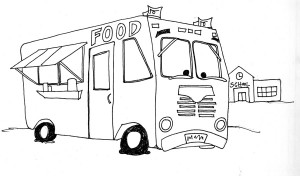New law impedes growth of food truck industry
Food trucks are lovely things. Normal restaurants are usually more well-regarded than food trucks because of their stability, but these trucks are much more accessible because of their ability to move.
Migrating from sidewalk to sidewalk and offering a variety of cuisines, food trucks are a surging industry in Los Angeles. Just walk along the streets surrounding USC to see how popular and varied this fleet has become.
In Los Angeles County, 2,650 trucks are registered with the Southern California Mobile Food Vendor’s Association, and the numbers are increasing. The industry has been boosted by the growth of Twitter, which allows fans of specific food trucks to receive constant updates on their routes.
As with any growing movement, however, there are those who see danger in the change.
California State Assemblyman William Monning sees food trucks as threats against nutrition.
Monning has introduced a bill that would forbid food trucks from parking within 1,500 feet of elementary schools, middle schools and high schools between 6 a.m. and 6 p.m. on school days. The bill is designed to counter the threat food trucks pose to the health of California.
Monning claims the trucks are targeting children: By offering low-cost, high-sodium foods close to schools, they are raising the rates of childhood obesity and diabetes.
Monning’s worries are valid, but he is combating them in a curious way. Child health issues definitely need to be addressed; measures banning soda from school vending machines and introducing healthier food choices are steps in the right direction. Still, this proposed bill is different.
This bill is not controlling what happens to schools, but rather small businesses, which are independent of the government. They are being punished as if they are criminals, having their available areas for setting up shop cut and diminished.
Laws regulating permitted distance from schools are usually reserved for drug dispensaries, which are only restricted from a 600-foot radius, and sex offenders, who pose a direct threat to school children. The corresponding “threat” from food trucks, however, is much less obvious.
Not all food trucks are created equal. For example, Green Truck, which has stopped by USC, sells vegan burgers made with local, organic produce. Don Chow’s Tacos, a regular near University Avenue, serves up tofu tacos with fresh avocado and pico de gallo. The bill makes no exceptions for trucks that aim to make healthy food more accessible.
Moreover, even though most trucks sell foods with less-than-optimal levels of nutrition, the sale of unhealthy food has never been a crime.
McDonald’s has been in business for 57 years, and it has never been restricted to certain areas. There are McDonald’s, Burger Kings and In-N-Outs across the street from high schools all over Los Angeles. None of these are illegal, and conceivably, none of them should be.
So how is it fair to so severely cripple food truck mobility, which is the very aspect of the food truck business that allows it to be successful?
In focusing on food trucks, the bill has good intentions, but it goes farther than it should. It implies that the food trucks are targeting the children in a way that is somehow worse than the ways McDonald’s openly does so with its Happy Meals.
It is more likely that the food trucks, which do not have the economic weight of a McDonald’s or a Burger King or the luxury of being firmly attached to one location, are being bullied by this bill because they are the only targets that can realistically be taken on.
The bill is unjust and should be voted down accordingly. The food trucks have every right to sell their snacks wherever they see fit, as long as McDonald’s and Burger King are permitted to do the same.
Daniel Grzywacz is a sophomore majoring in neuroscience and anthropology. His column “72 Degrees and Shaking” runs Wednesdays.

